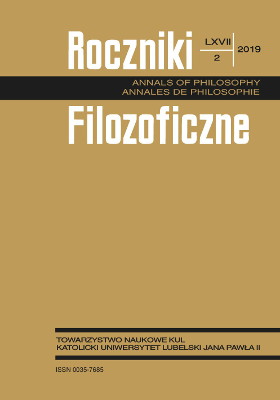Poznanie, jakim dysponuje dusza oddzielona od ciała po śmierci, według bł. Jana Dunsa Szkota na podstawie analizy Ordinatio IV d. 45 (XIV 135–197)
The Knowledge that Provides the Soul Separated from the Body after Death according to Blessed John Duns Scotus on the Basis of Analysis Ordinatio IV d. 45 (XIV 135–197)
Author(s): Grzegorz Witold SalamonSubject(s): Philosophy, History of Philosophy, Philosophy of Middle Ages
Published by: Towarzystwo Naukowe KUL & Katolicki Uniwersytet Lubelski Jana Pawła II
Keywords: John Duns Scotus; soul separated from the body; cognition; intellect; intellectual species
Summary/Abstract: The essay presents some gnoseological themes with reference to the intellect of the separated soul according to John Duns Scotus. Four questions of the Ordinatio IV, d. 45 deal with these themes. In this concret cognitive situation is possible, according to Doctor Subtilis, to get to know the new quiddities of things, in spite of a lack of the empiric cognition. It means leaving behind the conception of generic empiricism and moving to the recognition of more cognitive abilities, as in Aristoteles’s conception. In a post death state (post mortem) intellect continues to have the memory of the quiddities of things known while still connected with the body and can remember concret things and events known by the senses during earthly life. Such a gnoseological notion evidences the cognitive continuity of the human intellect after death, its incorruptibility and cognitive ability at least as such as one had during earthly life. We can see here the connection of philosophic and theological questions, which mutually condition and penetrate each other. According to Scotus it is possible for the intellect of the separated soul to remember the past and to acquire new cognition. Moreover, it is also possible for such an intellect to know the prayers we refer to the blessed in heaven. Such an intellectual approach evidences a strong Augustinian influence on John Duns Scotus’ epistemic conception.
Journal: Roczniki Filozoficzne
- Issue Year: 67/2019
- Issue No: 2
- Page Range: 31-58
- Page Count: 28
- Language: Polish

